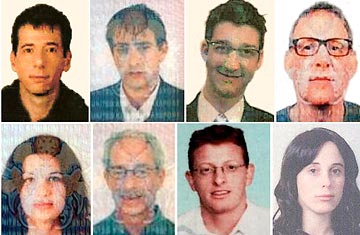
Photographs published by Interpol show suspects in the Dubai killing of Hamas leader Mahmoud al-Mabhouh
As more details emerge about the Jan. 19 assassination of a senior Hamas operative in Dubai, it looks increasingly like a badly botched operation. When the Dubai police first announced that the hotel room of Mahmoud al-Mabhouh had been locked from the inside, I dismissed that as an unimportant detail — maybe a way to delay the discovery of his body. But it turns out that the assassins in fact wanted the Dubai police to believe that Mabhouh had died of natural causes, a heart attack. It certainly looked that way at first. He was found in bed, undressed, and his pants were folded on a chair. That impression, though, was upended when the autopsy showed traces of a paralyzing agent in his bloodstream. From what's been pieced together so far, it seems that Mabhouh was incapacitated and then smothered.
No one with any sense doubts it was Israel's Mossad that assassinated Mabhouh. While Israel has not admitted it, the nation has also not denied it. The killing was publicly applauded by Tzipi Livni, leader of Israel's opposition and herself a former Mossad agent. And it had all the hallmarks of a Mossad operation — motivation (Mabhouh was buying Iranian arms for Gaza), a large number of people believed to be on the assassination team (26 at the latest count) and a network that spans Europe and the U.S. (where two of the alleged assassins traveled to from Dubai).
If Mossad were indeed responsible, it would mean that blame for Mabhouh's assassination could be put at the doorstep of Prime Minister Benjamin Netanyahu. Israel's Prime Minister has historically approved hits staged in countries with which Israel is not at war. Such details are unlikely to be made public anytime soon, but it does make you wonder what the deliberations might have been leading up to Mabhouh's assassination.
More than a few Middle East hands have shrugged their shoulders at the question; Netanyahu wouldn't have cared whether Israel were fingered for the assassination or not. The whole point, they say, was to send a reminder to Israel's enemies that it will eliminate them anywhere it can find them. When Mossad went after the Palestinian Black September movement in retaliation for the 1972 Munich Olympics massacre, it didn't give a damn about the diplomatic blowback. It was a case of an eye for an eye and the belief that the best deterrence is to strike fear in your enemies.
But the evidence that the assassins tried to make it look as if Mabhouh died in his sleep belies the deterrence explanation. And it doesn't answer the question as to why Mossad would risk exposing 26 operatives. A small intelligence service, it cannot afford to take that many people out of circulation by having their pictures beamed around the world. It also doesn't explain why the alleged assassins stole the identities of Israeli citizens. Israelis may be proud that their secret service can reach its enemies anywhere, but it serves no national or political interests to expose their people to retribution.
If Netanyahu authorized the hit, though, the real question is whether he really considered the strategic implications. Look at the map. If Israel goes ahead and bombs Iran's nuclear facilities, it will need over-flight clearances from the Gulf Arabs. Antagonizing the U.A.E. in this way, leaving almost no doubt that Israel was behind Mabhouh's assassination, does not seem the best way to facilitate such clearances. Nor does it help build an Arab Sunni coalition against Iran and its Lebanese proxy, Hizballah.
U.S. Vice President Joe Biden arrived in Tel Aviv this week to try to convince the Israelis that they should allow more time for new sanctions on Iran to work before taking any decision on bombing Iran. But the uncomfortable truth that must have hung in the air when Biden and Netanyahu met is that Iran's economic Achilles' heel is refined gasoline. The Islamic Republic imports about a third of its needs. And unfortunately, 75% of Iran's gasoline imports pass through the U.A.E. I would bet that, right now, Netanyahu is wishing that Mossad had been just a little better at covering its tracks.
Baer, a former CIA field officer assigned to the Middle East, is TIME.com's intelligence columnist and the author of See No Evil and, most recently, The Devil We Know: Dealing with the New Iranian Superpower.
